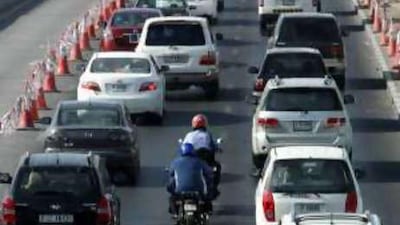DUBAI // Getting stuck in long traffic jams has become a fact of life for people in Dubai. But efforts to improve the situation, such as building new routes and the metro, have led to lanes being closed and more disruption. Congestion will get worse before it will get better. This week the chairman of the Roads and Transport Authority (RTA) said the effects of traffic congestion cost the Emirate about Dh4.6 billion each year. Health practitioners say frustration caused by traffic jams could have health implications. Dr Shereen Habib, a family medicine and women's health specialist at Dubai's Well Woman Clinic, said: "I'm sure it has a significant impact. Patients are always coming to me a bit flustered, late for their appointment because they have been stuck in traffic. "I myself feel that pressure every morning worrying that my patients will turn up before me." "For some people who have a tendency towards high blood pressure being stuck in traffic can make it worse," she said. "We see that. I think it has sadly become part of the lifestyle here." Symptoms of stress, she said, include dry mouth, palpitations, tightness of the chest and headaches. Dr Habib, who has been practising in Dubai for six years, is alarmed at how early people wake to beat the congestion and get to work on time. "I have heard stories about children waking at 4am to get off to school by 5.30am," she said. "Everybody is exhausted. I speak to people and they have had enough." All the early mornings and late evenings out on the road mean diet also suffers, she said. "If you're getting home late, and it happens to my husband, you don't feel like cooking. It's easier to go out or order in, especially single people who tend to have less motivation to cook alone anyway." One of Dubai's current congestion hot spots is The Greens. Resident Dan Brown, 29, a British-born auditor, says he spends up to an hour each morning trying to leave the development. "It's a nightmare," Mr Brown said. "I live on street five and if I leave home between 8am and 9.30am it can take about an hour to leave The Greens. It's not just resident traffic causing the problems, it's people coming through there who don't live there, and also roadworks. "It's even bad at weekends now. I worry I may have a heart attack. I can feel my blood pressure rising. It makes me a lot less tolerant of people, quite angry and very jumpy. "It's a good job they don't let people carry guns or there would be a lot of problems." Riad Sandakli, 45, a media relations officer raised in Dubai, spends three hours on the road between Ajman and Dubai every day and spent weeks perfecting a route that allows him to avoid the scores of queues awaiting commuters most days. "It's an extra 30km but it's worth it because at least you don't have to keep stopping. I'm getting high blood pressure because of the congestion." Mr Sandakli, who is married with four children, eats his breakfast in the car to pass the time but says that despite his route, Thursday nights are still "killers". "Whichever roads you take to Ajman on a Thursday it's a killer 21⁄2-hour journey on Thursday," he said. "I don't get home before 9pm. My family find it hard. I get frustrated that I'm spending 13 hours a day outside of my home. I try and make it up to them on the weekend but it's not the same." A British expatriate teacher, Austin Britland, 27, spends around 30 minutes each morning trying to leave his apartment in Discovery Gardens. "Traffic from The Gardens meets traffic from Discovery Gardens and it becomes chaotic, although a new route has been introduced which takes you down to the Marina exit, and that isn't bad once you can get to it," he said. For him the biggest frustration is queue-jumpers. "People pushing in at junctions, speeding and flashing their lights at you to bully their way past. When I leave the UAE there are many things I will miss but not the driving." It is not just individual drivers who suffer as a result of the endless jams and snail-pace traffic. Ben Munroe, logistics manager for BRM Construction, in Dubai, said transporting labourers to site is a daily problem he hopes RTA road-development plans will help solve. "Clients expect us to be on site as early as possible - usually around 7am - to get as much done as possible," he said. "Some days it can be fine but other days traffic means we suffer a two-hour delay getting started. The delay costs us in time, which we pay for in labour, and we lose two hours in production." Material transport also suffers. "The big trucks are only allowed on certain roads at certain times and these can often be peak times. By car the journey they have to make takes about 10 minutes but by truck we only manage to get three deliveries a day out. I have had to take on more vehicles to get the materials out. "I certainly welcome everything the RTA is doing to solve the problems." loatway@thenational.ae

Frustration as pressure on roads intensifies
As Dubai's traffic congestion problem grows, the city's weary motorists are finding their daily commute increasingly arduous.
Most popular today
